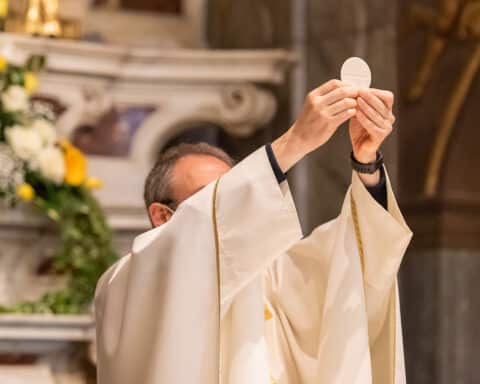
— Dennis Diebolt, via email
Answer: Your premise that the miracle of the fish was first is problematic for a number of reasons. Not only does John’s Gospel call the changing of water to wine the first miracle, but Luke’s Gospel also notes a number of miracles prior to the miracle of the fish. In Luke 4:14, Jesus returns from the desert and begins preaching in the Synagogues of Galilee. In Luke 4:31, he casts out a demon in the synagogue of Capernaum. Then in Luke 4:38 he heals Simon’s mother-in-law and proceeds to miraculously heal a large number who came to him in Capernaum. It isn’t until Luke 5:4 that the miracle of the fish takes place and, in effect, seals the deal, such that Peter, Andrew, James and John are ready to leave everything and follow him.
Prior to this moment, however, as we can see, they had been in Jesus’ company, saw him work miracles and were learning from him. As such, they were “disciples,” a word that means “learners” or “students.” In the early moments of this period, the wedding at Cana took place and his first miracle occurred, probably between Luke 4:14 and Luke 4:31 as noted above.
While the time frame of the four Gospels is not as precise as we moderns might like, there is no reason we cannot take John at this word that this was the first public miracle worked by Our Lord and that, on account of it, his disciples began to believe in him. Shortly thereafter, he would relocate with them to Capernaum, the town of Peter, Andrew, James and John, and work the miracles described above from Luke’s account. As noted, that miracle of the fish so moved them that they were ready to follow the Lord radically. But it was not the first.
Adultery of heart
Question: Jesus tells us that we commit adultery when we look at a woman lustfully. Does that mean that we need confession before we receive the Eucharist again?
— Paul VanHoudt, Erie, Colorado
Answer: To answer your question, we must first ponder what it means to look with lust. We all find certain people attractive. That a man finds women or a certain woman attractive is natural and according to God’s design; it is not sinful. However, most people also experience randomly occurring thoughts about others that are impure or inappropriate. These sorts of thoughts may simply pop into one’s mind and are a temptation either of the world, the flesh or the devil. But a temptation, of itself, is not a sin unless it is indulged. As long as one dismisses such thoughts and seeks not to dwell on them, they are not usually sinful, or what the Lord means by looking with lust. In this matter, the question arises about how quickly one must dismiss the impure thought. Thoughts often occur at random and are impulsive. Further, something would not be tempting if it did not involve a pleasure of some sort. As long as one concludes quickly that an impure thought or temptation is inappropriate and rejects it, one does not incur sin.
When do we start to consent to the thought? This is difficult, at times, to know. It’s like the distance between the paint and the wall. Where does the wall end and the paint begin? If one is trying to live a virtuous life and is not frequently exposing themselves to temptations such as pornography, the benefit of the doubt can be theirs.
So, what does it mean to look with lust? To put the phrase in modern terms, we might describe it as actively and willfully fantasizing in a sexual way about someone who is not our spouse. Dwelling on thoughts or imaginations of this sort is sinful. Obviously, viewing pornography or reading sexual material is excluded by Jesus’ teaching as well. This is also the reason that masturbation is wrong since it involves actively fantasizing. If one does actively fantasize or view pornography, confession is certainly required before holy Communion. As noted above, the mere fact of an impure thought, which may happen frequently to some, does not of itself mean that one has sinned. Our own examination of conscience must determine when and to what extent we consented to or dwelt on such thoughts, avoiding either laxity or scrupulosity.
Msgr. Charles Pope is the pastor of Holy Comforter-St. Cyprian in Washington, D.C., and writes for the Archdiocese of Washington, D.C. at blog.adw.org. Send questions to msgrpope@osv.com.





